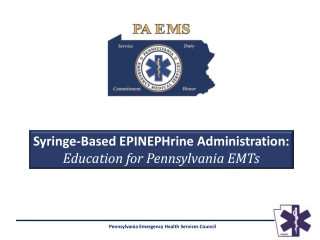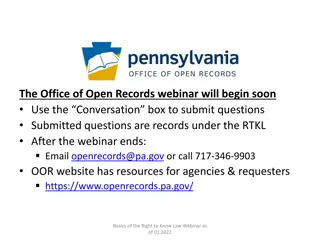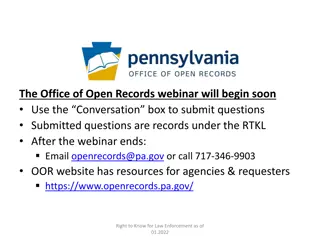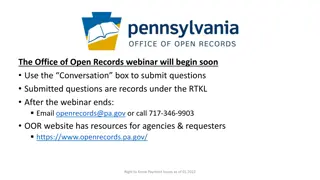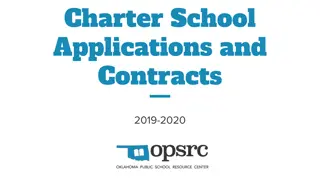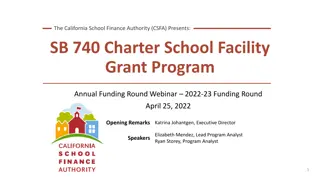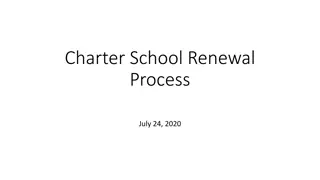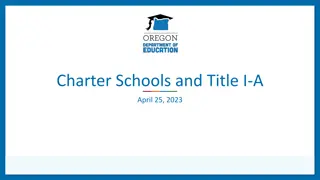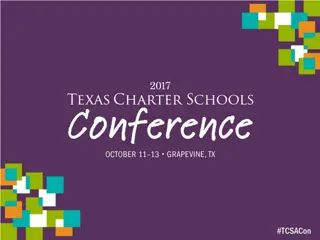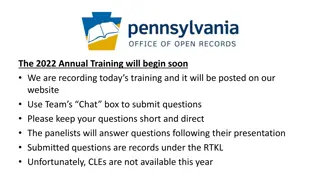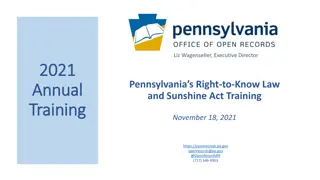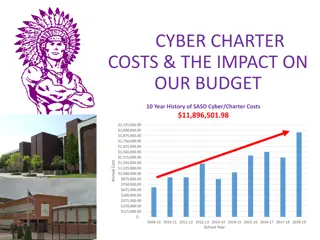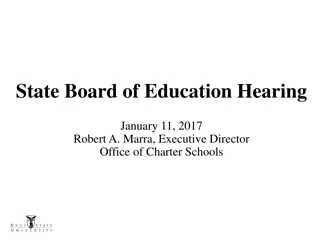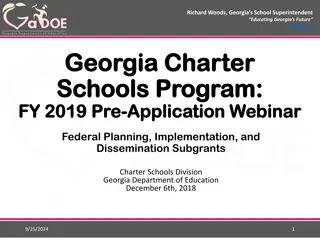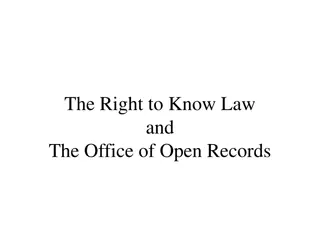Understanding Pennsylvania's Right to Know Law for Charter School Administration
Pennsylvania's Right to Know Law ensures public access to government records. Agencies must appoint an Open Records Officer, follow regulations, and cannot limit record requests. Requests must be specific and timely responses are required.
Download Presentation

Please find below an Image/Link to download the presentation.
The content on the website is provided AS IS for your information and personal use only. It may not be sold, licensed, or shared on other websites without obtaining consent from the author. Download presentation by click this link. If you encounter any issues during the download, it is possible that the publisher has removed the file from their server.
E N D
Presentation Transcript
Charter School Administration: Compliance with State and Federal Laws and Regulation Presented by: Brian H. Leinhauser, Esquire The MacMain Law Group, LLC 101 Lindenwood Drive, Suite 160 Malvern, PA 19355 484-318-7106 Bleinhauser@MacMainLaw.com
Right to Know Law Pennsylvania s Right to Know Law is a series of laws designed to guarantee that the public has access to public records of governmental bodies. The law states that all documents will be presumed to be open to the public unless the agency holding them can prove otherwise. Any United States citizen may request public records and no statement of purpose is required.
Right to Know Law, cont. What is a record? The Right to Know Law defines records as information, regardless of physical form or characteristics, that documents a transaction or activity of an agency and that is created, received or retained pursuant to law or in connection with a transaction, business or activity of the agency.
Agency Obligations Must appoint an Agency Open Records Officer. May promulgate regulations and policies necessary for the agency to implement the Right to Know Law. May create your own request form, but must accept the Uniform Request From developed by the Office of Open Records.
Prohibitions An agency may not adopt a policy or regulation which: Limits the number of records which may be requested or made available for inspection or duplication; or require disclosure of the purpose or motive in requesting access to records
A request must Be addressed to the Open Records Officer Seek a record Be sufficiently specific to identify the record that is being sought Subject: must identify a transaction or activity of the agency for which the record is sought. Scope: must identify a discreet group of documents either by type or recipient. Timeframe: needs to be finite.
Upon receipt of a request... Note the date of receipt A response is due within 5 business days Maintain a copy of the request until it is fulfilled If denied, the request must be kept for 30 days or, if appealed, until the Office of Open Records issues the Final Determination Retain all request related correspondence
Extensions A 30 calendar day extension may be unilaterally invoked if: It is done within the initial 5 business day window It is done in writing to the requestor A reason is provided consistent with Section 902 A date is provided that the requestor can expect a response An estimate of costs is given
Grounds for an Extension The request requires redaction. The request requires the agency to retrieve documents that are stored in a remote location. The agency cannot respond due to bona fide and specified staffing issues. A legal review is necessary to determine whether the record is subject to access. The requester has not complied with the agency s policies regarding access to records. The requester refuses to pay applicable fees. The extent or nature of the request precludes a response within the required time period.
Access/Payment Issues Agency is only required to provide the record in the current medium. Cannot charge for electronic records. Must allow requester to use their own equipment to make copies Cannot charge for labor/redaction/legal review Can only charge for the actual cost/pass-through costs. No surprises contact the requester with an estimate before the work starts.
Denying Access A denial must include: A description of the requested record The legal and factual grounds for denial Name, title, signature, business address, and phone number of the Records Officer Date of response The procedure to file an appeal with the Office of Open Records If the agency denies or deem denies a request, an appeal may be filed within 15 business days
Sunshine Act Applies to any state or local government body and all committees that perform an essential government function and exercises authority to take official action. Charter School Boards are covered
Public Notice Three days in advance of the first regular meeting of the year, along with all of the remaining meetings. Printed in a newspaper of general circulation. Posted at the meeting site. Special meetings require 24 hour notice.
Public Comment The public has a right to comment on issues that are or may be before the board. Commenters can be limited to residents and taxpayers. Board may establish reasonable rules for public comment.
Executive Sessions Can be held before, during, or after an open meeting. Complete reason must be announced during the open meeting. No official action can be taken during an Executive Session.
Allowable Reasons for Executive Sessions Personnel matters (hiring, firing, discipline) Discussing labor negotiations Considering purchasing or leasing property Consulting with counsel about litigation Avoiding violating privilege or confidentiality
Miscellaneous Must produce meeting minutes recording board attendance and who voted for and against No requirement for an agenda The public can record public meetings Agency recordings and minutes are public records Agencies can cure violations (i.e., notice, etc.)
Ethics Law Who is covered? Public Officials Any person elected by the public or elected or appointed by a governmental body, or an appointed official in the Executive, Legislative, or Judicial Branch of the state or any political subdivision thereof, provided that it shall not include members of advisory boards that have no authority to expend public funds other than reimbursement for personal expense, or to otherwise exercise the power of the state or any political subdivision thereof Members of the Boards of Trustees of charter schools Public Employees Candidates Nominees
Statement of Financial Interest Must be filed each year the position is held and the year following termination of service Must be field by May 1 of the following year The form must be completed in full The form must be signed Must be filed with the charter school and remain on file there it is not submitted to the state But it must be available if there is an audit
Statement of Financial Interest Must include: Name, address (business or residence), and position Occupation Real estate interests in which the Commonwealth or a political subdivision is involved Creditors: the name and address of the creditor(s) and the interest rate for each debt in excess of $6,500. Mortgages secured by the principal or secondary residence of the filer and loans extended between members of the immediate family need not be listed.
Statement of Financial Interest Sources of income: the name and address of each direct or indirect source of income totaling $1,300 or more. Include governmental bodies served, employers, and all other sources of income meeting the applicable disclosure threshold. Include any payment, fee, salary, expense, allowance, forbearance, forgiveness, interest, dividend, royalty, rent, capital gain, reward, severance payment, prize winnings, and tax exempt income. DO NOT INCLUDE: gifts, governmentally mandated payments/benefits, or retirement, pension, or annuity payments funded totally by contributions of the official/employee
Statement of Financial Interest Gifts: The name and address of each source of gift(s) of $250 or more in the aggregate and the value and circumstances (including a description) of each such gift. Gifts from family members and certain friends are exempt. (A gift is defined as anything that is received without consideration of equal or greater value, excluding (1) political contributions otherwise reportable as required by law; (2) commercially reasonable loans made in the ordinary course of business; or (3) hospitality, transportation, or lodging.)
Statement of Financial Interest Must include, cont. Any office, directorship, or employment of any nature whatsoever in any business entity, regardless of compensation. Any financial interest in any legal entity engaged in business for profit. The term financial interest is defined as any financial interest in a legal entity engaged in business for profit which comprises more than 5% of the equity of the business or more than 5% of the assets of the economic interest in indebtedness. The name and address and financial interest held in a business which has been transferred to a member of the filer s immediate family (parent, spouse, child, brother, sister) during the prior calendar year.
Penalty for Failure to File Any person who fails to file a Statement of Financial Interests as required by the Ethics Act may be found guilty of a misdemeanor and fined not more than $1,000 or imprisoned for not more than one year or be both fined and imprisoned. Any public official or employee who is required to file a statement and does not do so or who files a deficient statement may be penalized up to $25 per day for each day said statement is delinquent or deficient, for a maximum of $250.
Restricted Activities Conflict of Interest Seeking Improper Influence Accepting Improper Influence Honorarium Contingent and Severance Payments Contract (valued at more than $500) Former Official or Employee Misuse of Statement of Financial Interest Former Executive-Level Employee Voting Conflict
Questions If you have any questions, please don t hesitate to ask now or contact me after this is complete Brian H. Leinhauser o BLeinhauser@MacMainLaw.com o 484-318-7802





